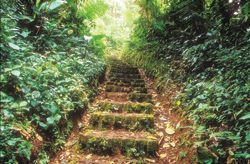Top Ten Rules of Eco-Travel
How to Make a Difference When You Go
Planning your next vacation? How about Nicaragua? Or Cambodia? What about Borneo? All of these destinations have thrown their names into the tourism market, thanks in large part to ecotourism, which the New York Times called "the buzzword of 2006."

"Ecotourism is one of the fastest growing types of travel because people want more independence," says Dale Galvin, a vice president at Rare, an international conservation group. Not to be mistaken with adventure travel, which puts more emphasis on the adrenaline rush, ecotourism aims to give travelers a responsible peek at places off the beaten path.
With growing tourist economies in just about every corner of the world (an estimated 25,000 tourists visited Antarctica in the 2003-2004 summer season, for instance), communities are now facing the question of how to preserve the natural beauty that’s attracting flocks of visitors. Unfortunately, the only thing eco-friendly about some so-called eco-vacations is their name. So it’s up to us to take responsibility for the way we travel. Here’s how:
1. Research, research, research. When looking for a reputable guide, see what others have said. For extra reassurance, check for certification. Sustainable Travel International (STI) spent three years researching and implementing a U.S. certification program, explains co-founder and president Peter Krahenbuhl.
2. Take only pictures and leave only footprints. Swiping a natural relic like a shell or piece of coral for a souvenir seems like a forgivable act, but if the rules are bent for you, they"ll be bent for everyone else, too. Resist the urge and take a picture instead. Similarly, seeing the Nile River may have changed your life for the better, but leaving your trash there is changing its ecosystem for the worse.
3. Spend your money locally. "Supporting the local economy is key," says Dale Rosselet of the New Jersey Audubon Society. Many tour operators do not employ locals, which reduces the community’s stake in preserving natural areas.
4. Conserve resources. Clean drinking water can be hard to come by in many parts of the world, so think about ways you can conserve: take shorter or fewer showers; have towels and linens washed less frequently; and turn off the faucet when you brush your teeth. Turn off lights and air conditioning when you leave the room. Also look for hotels through the Green Hotels Association.
5. Walk whenever possible. It’s good exercise, great for seeing the sights, and it reduces use of gasoline. Best of all, it’s free! Most ecotourism destinations also give travelers the option of renting bikes.
6. Stay on the trails. Magellan, you are not. That ship has sailed, and it’s pretty unlikely you"ll be discovering uncharted territory. By sticking to the trails, you are ensuring that you won’t be disturbing any endangered animals, stepping on any rare flora or trampling through someone’s backyard.
7.Gain some cultural knowledge. Sometime between lying on the beach, hiking in the canyon and getting a hot stone massage, think about scheduling a time to learn more about the region you are visiting. Stopping by a tourism center or hiring a local guide will not only make your vacation more memorable, but it will help make you a more congenial traveler.
8. Try to use the least-polluting transportation. Because planes use so much fuel for take-offs and landings, Climate Action Network Europe suggests avoiding planes for trips less than 625 miles. Cars are also major polluters, so your best bet is to take a train or a bus.
9. Offset your travel emissions. "On a flight between New York and Los Angeles, you are emitting about one ton of greenhouse gases," says STI’s Krahenbuhl. "Donate $15 per ton, and we"ll put that into building a solar oven in Africa so they won’t need to burn fossil fuels anymore."
10. Eat local produce. A University of Iowa study found apples bought in the United States had traveled, on average, 1,700 miles. Therefore, your best bet is to support the farmers local to your destination. Plus your food will be especially fresh. Who could argue with that?
RACHEL ANDERSON is an E intern and an avid world traveler.

